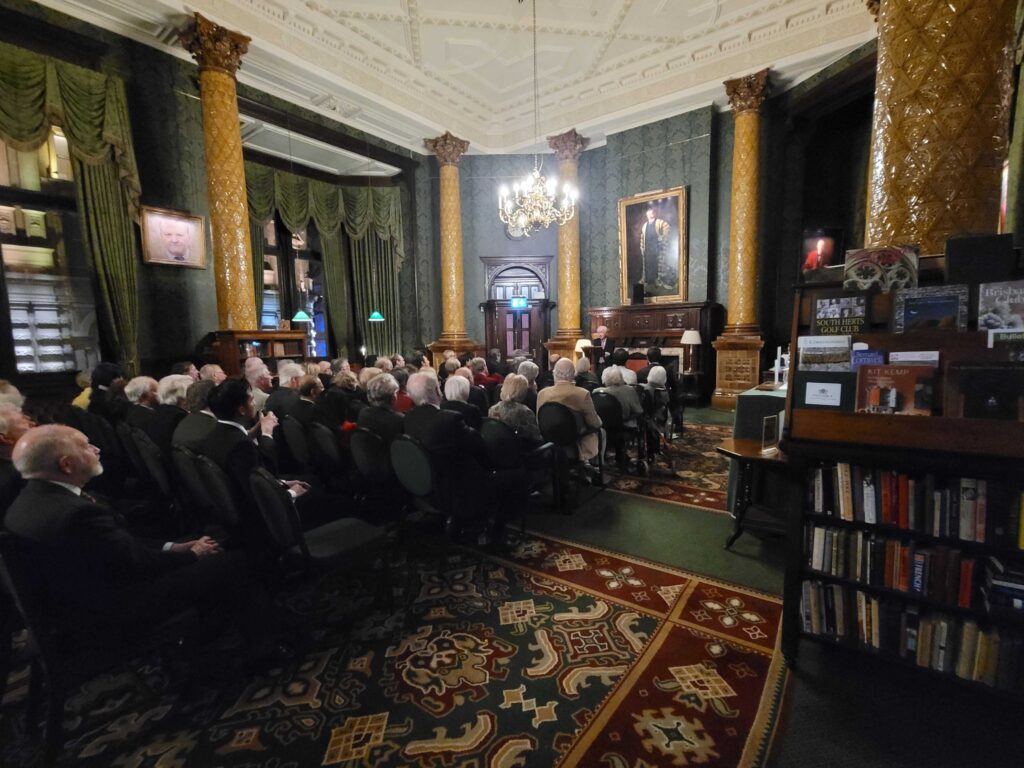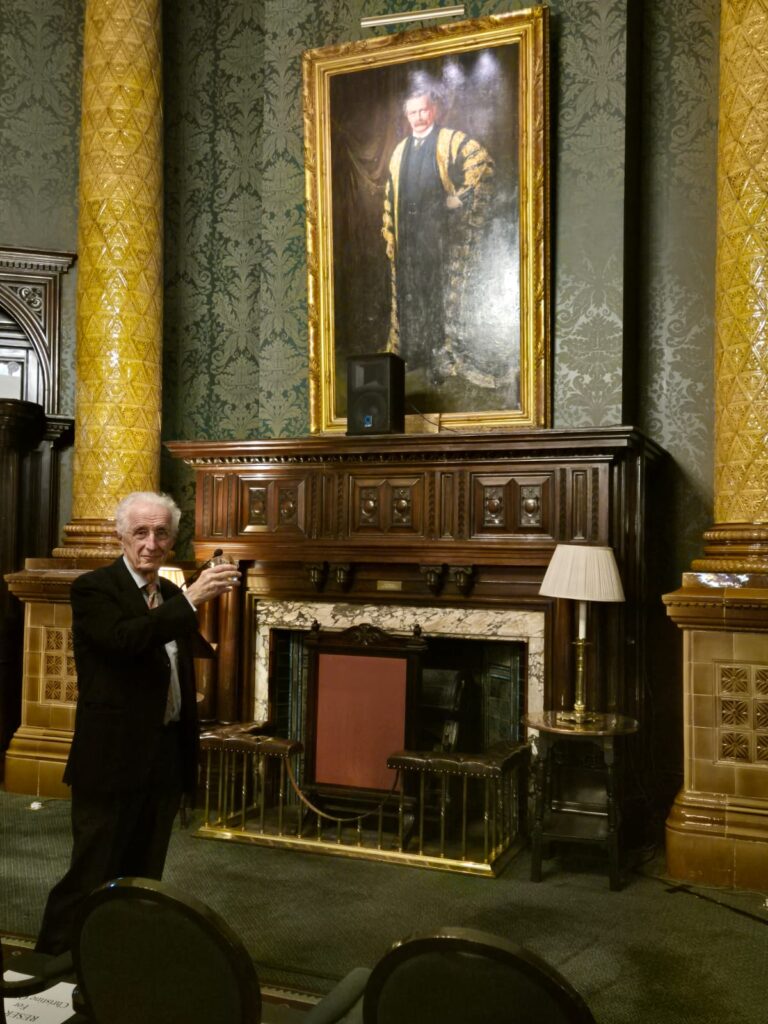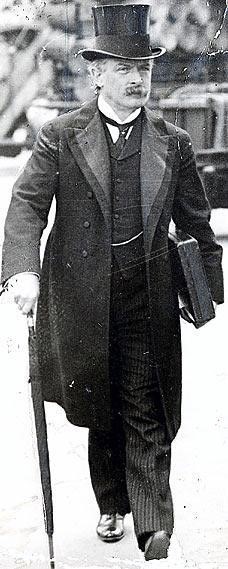Richard Rhys O’Brien: Remembering Margaret and David Lloyd George – National Liberal Club, 26th March 2025.

The following is a copy of the speech Richard Rhys O’Brien gave to the National Liberal Club for the Remembering David Lloyd George Event. Thank you to Richard for the kind permission to reproduce his speech for our readers and members.
May I begin with a bold assertion: if it were not for my grandfather, the Rev J. T. Rhys, private secretary of Margaret Lloyd George at No. 10, David Lloyd George might not have been with us tonight. When this Club was refurbished after wartime requisitioning, the portraits of Lloyd George and Churchill were left in the cellar, the club being more of an Asquithian persuasion. It took active campaigning by my grandfather and others to right that wrong.
There is also a photo of Margaret Lloyd George tucked away in a corner in the Lounge.
Uncovering the Archive
My grandfather left behind an archive of papers – some 30 speeches, and many letters – which lay unread in a box. When I was young I thought it was rather fun to know my grandfather was at No. 10 but whilst everyone was proud of him, not a lot was said.
One reason I discovered was that the family was divided between Lloyd George and Asquith: one brother founded the first bilingual Welsh newspaper, The Welsh Gazette – I did hear about that – and another was the secretary of the Cardiganshire Liberal Association. Both Asquithian in a staunch Liberal family, the brothers’ father and grandfather both having been punished by Tory landlords when voting Liberal in 1868.
Exploding the Myth
As a result, I held the conventional view of Margaret Lloyd George – a quiet Welsh woman, preferring to stay in her beloved North Wales when possible.
Whilst the archive holds no smoking guns to explode our theories of history, nor any gossipy material that sometimes sells books, it has exploded my misconception. Margaret Lloyd George was possibly the most active spouse of a Prime Minister this country has seen, playing an important role in supporting his political career, not least when others were deserting him. In my view, one of the smartest decisions David Lloyd George made in his life was marrying Margaret Owen.
Margaret Lloyd George: Political Campaigner
My first book on Margaret Lloyd George, published in October 2022, 100 years after Lloyd George’s fall from power, reveals her active political campaigning around the country – something tricky for PM’s spouses to pull off. She played a decisive role in the infamous Lloyd Georgian victory in the 1921 Cardiganshire by-election, though that win over the rival Asquithian candidate and former Lloyd George ally Llewelyn Williams, worsened the growing rift in the Liberal Party. In wartime and in peacetime, when Lloyd George was either holed up in his kitchen Cabinet in the garden sheds of No. 10 or otherwise absent from Question Time, and by convention not able to campaign in by-elections, she was the voice and face of Lloyd George. “I am my husband’s deputy”, she once wrote.
In the 1918 so-called Coupon Election, which Lloyd George and Bonar Law controversially called to continue their temporary wartime coalition, it was Margaret who was on the hustings, in a whirlwind two-week tour urging women to vote, whatever their own husbands felt. It was Margaret who was on the spot supporting Coalition candidates when an Asquithian Liberal was also on the ticket. In 1919 she was on the hustings supporting the Tory Nancy Astor on the eve of the first election of a woman to Parliament – defeating the Liberal Isaac Foot, father of the Foot dynasty.
She was urged to stand for Parliament herself, but was smart enough to know that wasn’t the place for her.
On the post-war hustings, she would not shy from attacking opponents of her husband: criticism was fair enough, but unfair criticism was not. With Labour an emerging threat (and Russia had just had a Revolution) she could warn of the dangers of the Red peril as well as anyone. Imagine a kind smiling face backed by a clear sense of right and wrong.
She prepared for speeches well, using notes or ad-libbing from the podium or the back of an open car at the roadside. I suspect she learned her speaking style from the chapel as well as when supporting her husband, commenting on his performances, and famously as he defended his 1909 Budget, sitting all night watching him from the House of Commons Ladies Gallery when all others had gone to bed.
Whilst a campaigner for the rights of women and girls and children, she was not a hard-line suffragette. Physical attacks on her husband probably strengthened her preference for non-violence.
Readying for War
Whilst Lloyd George was later lauded as the Man Who Won the War (Bonar Law quipped he could have been re-elected for life), his first challenge was in deciding whether or not to support the war. He had risked his career opposing the Boer War as an unjustifiable imperial escapade.
In 1914 all eyes were on him, as Chancellor of the Exchequer, as to which way he would jump. Whilst he was going along with government policy, it was a hard decision (the outcome of which we might take for granted with the benefit of hindsight). He finally went public on 19th September, six weeks into war, in his notable speech at the Queen’s Hall on Regent’s Street, supporting the “just” war as well as calling for a Welsh Army to be raised (against Kitchener’s opposition).
Yet his wife, “The Woman Who Helped Win the War”, had been out there recruiting straightaway, from the beginning of August, urging men to enlist, women to offer their services as nurses, and even urging the Admiralty to send a gunboat to Cardigan Bay in a show of strength.
Their son Richard Lloyd George wrote later:
“My mother hated the thought of war – not only as the mother of two sons of military age – but also because of her peaceful upbringing. But she came to hate the Godless brutes who came to plunge the world into four and a half years of carnage more than she hated war itself. Perhaps I am the only one (besides my father) who can understand how my mother’s attitude towards killing insensibly influenced him in those summer days of 1914.”
Wartime Welfare
My second book, “The Woman Who Helped Win the War”, the prequel to her peacetime politics, now reveals her wartime welfare campaigns: comforts for the troops, hostels for sailors, food kitchens and economising in a time of great shortages, temperance when troops and workers (especially munitions workers) needed to stay sober, hospitals and long term care and support for the wounded and their families, and urging men and women to do their bit.
Chancellor David Lloyd George was still laying the foundations of our welfare state – still, it seems work in progress. The Royal Commission on Poor Laws and Relief of Distress had just published its Majority Report arguing that charitable provision should continue to play a central role in the future development of welfare, whilst its Minority Report called for the public provision of welfare, an approach championed by the Labour Party.
The day war was declared a cabinet committee was charged to report on how to deal with distress caused by the war, and the Labour Party published its War Manifesto with 12 demands for state aid and action. Most of the latter demands were delivered by the end of the war, with the exception of housing. There was an explosion in charitable giving, around 18,000 organisations being established to raise money and aid.
As Mrs Peel, director of the women’s service at the new Ministry of Food later put it, somewhat inelegantly, or colourfully “Masses of rather inarticulate people quickly got together and committees seemed to exude from the mass and to coagulate more or less at random”.
Supporting the Troops
One legacy of this wartime spirit was the establishment of the country’s first charity regulator, as there were, as always, some enterprises exploiting people’s generosity. Margaret Lloyd George could be trusted, and used her position in Downing Street to establish a highly cost-efficient Troops Fund, providing comforts for the troops, knitted scarves, socks, sweets and cigarettes, and later, Bibles, gramophones, harmonicas, cricket bats, but drawing the line at Christmas puddings, fearing overwhelming demand.
Her active committee was administered by its secretary William Lewis, a Welsh born shipping man from Liverpool, then the prospective Liberal Candidate for Radnor, the constituency of my co-speaker this evening, David Chadwick, MP. However his wartime work led Lewis to step down from his candidacy and he did not contest the 1918 election. Having campaigned for men to join the army, he campaigned to support them on their return, so many wounded for life.
From the start some didn’t see why the War Office wasn’t providing all the Troops’ needs, and charity fatigue set in as people’s pockets were emptied. Every day, a Flag Day, almost. But Margaret Lloyd George, like her husband, had her own persuasive skills: as she later reflected:
“My experience of social warwork teaches me that if charity is still a rarity, vanity is certainly not”.
Coping with Shortages
Some of the organisations still exist today such as Save the Children, St Dunstan’s for the Blind, and the British Legion. In contrast, most of the many food kitchens and restaurants established to feed a country on short rations were closed not long after the war. I quote in my book a colourful article from the Daily Herald calling for the nationalisation of the excess-profit making catering industry. Germany’s U-Boats were blocking supplies, and Lloyd George’s successful convoy system, which he fought for against Admiralty opposition, would prove critical in keeping shipping lanes open. Her support of the Sailors Society, for which my grandfather left his parish in Swansea to serve in London, during wartime, was part of this overall effort to win the war.
In another domestic economy campaign, ladies were urged not to spend money on the latest fashions and to buy war bonds with their savings. Interestingly their thrift was partly offset by the increase in spending on clothes by the many more women who were now working, earning money they could now spend on themselves.
Keeping the Country Sober
Margaret Lloyd George, and my grandfather, were disappointed that their temperance campaigning fell short, though it is said that alcohol consumption in the country, which fell during the war, didn’t reach pre-war levels again until the 1960s. It was critical to keep the troops sober (though the rum ration had a counter effect), and important to reserve barley for food.
The temperance movement was as divided as the Liberal Party, hardliners pushing to seize this opportunity for total prohibition of drink, as recently imposed in the US, whilst Margaret, David, and my grandfather – to name just three! – preferred to take it step by step, allowing localities to decide how hard to clamp down – the so-called Local Option. Restricting one of the few pastimes left to a people undergoing austerity was not a step to be taken lightly. Lloyd George could satisfy no-one: the man who won the war was also the man who put a penny on a pint and watered it down.
Healthcare and Recruitment
Her other two wartime campaigns were in healthcare and recruitment. As injured troops returned home in their thousands, she supported hospitals around the country, and continued to support the fight against tuberculosis.
It was her active campaigning for army recruitment that surprised me. Again, a divisive issue: in general the non-conformist chapels swung behind the war and recruitment.
Lloyd George’s ally Llewelyn Williams, was willing to support the war and voluntary enlistment, and gave his time freely to help Lloyd George getting his new Ministry of Munitions up and running, by checking the myriad of laws that needed to be modified (shades of the fallout from Brexit) – but conscription was a step too far. Margaret Lloyd George’s final recruitment rally was held just before compulsion was enacted.
I try to avoid the trap of seeing only the positive in my subjects, but if I wanted to criticise her I would struggle. She kept her family together and I believe she and her husband always held each other in great respect and supported each other. I suspect he was more in her debt than the other way round. It was Margaret at the bedside of Lloyd George’s dying uncle Richard, when the PM was in Paris trying to organise a more unified line of command with the allies. It was Margaret who nursed David through his 10 days in bed with the flu in August 1918 in Manchester’s town hall – the city of his birth – it was touch and go, the war was not yet over.
He went home and she returned to Cricieth and, it is said, when she caught the flu, he only learnt from the newspapers. Imagine COVID with a war on at the same time.
My grandfather also had some political ambitions and in 1922 ran briefly for the Twickenham seat, but withdrew at the last minute due to” ill health”. I suspect that was a diplomatic excuse, as he was most likely one of Lloyd George’s so-called “retaliation” candidates put up as a spoiler in the campaign, mostly being withdrawn at the last minute. Twickenham was finally won for the Liberals in 1997 by Vince Cable.
However, my grandfather did gain a Twickenham seat, as minister of the local Congregational Church, which turned out more political than the House of Commons, power being democratically shared between pastor and congregation.
In my final, book-marketing pitch, which may backfire, may I quote from my grandfather’s notes for a preface to her putative memoir:
I would have thought that the number of volumes already published in whose titles the name Lloyd George appear – some way or another ought to have satisfied the public – but Publishers say no and they ought to know.
Her own story will now be much more widely appreciated. David and Margaret Lloyd George were both remarkable people. Both served their country well as it sought to meet its tough challenges, in peacetime and in urgent crisis. It is right they are still remembered with appreciation.
Use the following links to buy Richard’s books:
The Woman Who Helped Win the War: The Welfare Campaigns of Margaret Lloyd George 1914-1918
The Campaigns of Margaret Lloyd George: The Wife of the Prime Minister 1916-1922
David Chadwick, the MP for Brecon, Radnor and Cwm Tawe, also delivered a speech. We hope to be able to provide this soon.

